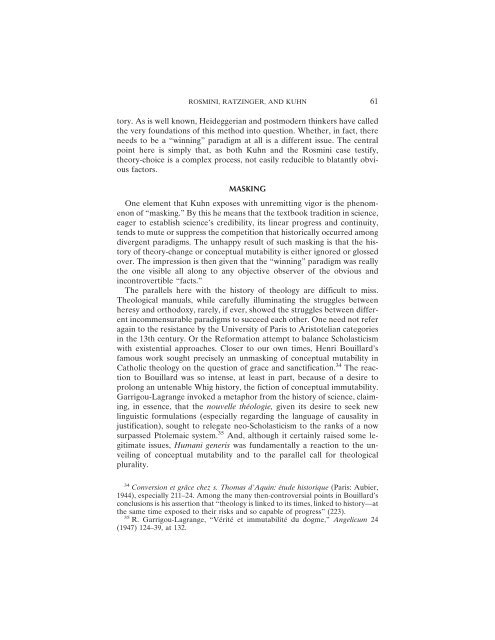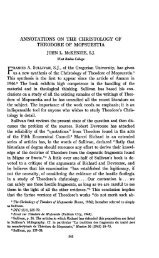rosmini, ratzinger, and kuhn - Theological Studies
rosmini, ratzinger, and kuhn - Theological Studies
rosmini, ratzinger, and kuhn - Theological Studies
You also want an ePaper? Increase the reach of your titles
YUMPU automatically turns print PDFs into web optimized ePapers that Google loves.
ROSMINI, RATZINGER, AND KUHN<br />
61<br />
tory. As is well known, Heideggerian <strong>and</strong> postmodern thinkers have called<br />
the very foundations of this method into question. Whether, in fact, there<br />
needs to be a “winning” paradigm at all is a different issue. The central<br />
point here is simply that, as both Kuhn <strong>and</strong> the Rosmini case testify,<br />
theory-choice is a complex process, not easily reducible to blatantly obvious<br />
factors.<br />
MASKING<br />
One element that Kuhn exposes with unremitting vigor is the phenomenon<br />
of “masking.” By this he means that the textbook tradition in science,<br />
eager to establish science’s credibility, its linear progress <strong>and</strong> continuity,<br />
tends to mute or suppress the competition that historically occurred among<br />
divergent paradigms. The unhappy result of such masking is that the history<br />
of theory-change or conceptual mutability is either ignored or glossed<br />
over. The impression is then given that the “winning” paradigm was really<br />
the one visible all along to any objective observer of the obvious <strong>and</strong><br />
incontrovertible “facts.”<br />
The parallels here with the history of theology are difficult to miss.<br />
<strong>Theological</strong> manuals, while carefully illuminating the struggles between<br />
heresy <strong>and</strong> orthodoxy, rarely, if ever, showed the struggles between different<br />
incommensurable paradigms to succeed each other. One need not refer<br />
again to the resistance by the University of Paris to Aristotelian categories<br />
in the 13th century. Or the Reformation attempt to balance Scholasticism<br />
with existential approaches. Closer to our own times, Henri Bouillard’s<br />
famous work sought precisely an unmasking of conceptual mutability in<br />
Catholic theology on the question of grace <strong>and</strong> sanctification. 34 The reaction<br />
to Bouillard was so intense, at least in part, because of a desire to<br />
prolong an untenable Whig history, the fiction of conceptual immutability.<br />
Garrigou-Lagrange invoked a metaphor from the history of science, claiming,<br />
in essence, that the nouvelle théologie, given its desire to seek new<br />
linguistic formulations (especially regarding the language of causality in<br />
justification), sought to relegate neo-Scholasticism to the ranks of a now<br />
surpassed Ptolemaic system. 35 And, although it certainly raised some legitimate<br />
issues, Humani generis was fundamentally a reaction to the unveiling<br />
of conceptual mutability <strong>and</strong> to the parallel call for theological<br />
plurality.<br />
34 Conversion et grâce chez s. Thomas d’Aquin: étude historique (Paris: Aubier,<br />
1944), especially 211–24. Among the many then-controversial points in Bouillard’s<br />
conclusions is his assertion that “theology is linked to its times, linked to history—at<br />
the same time exposed to their risks <strong>and</strong> so capable of progress” (223).<br />
35 R. Garrigou-Lagrange, “Vérité et immutabilité du dogme,” Angelicum 24<br />
(1947) 124–39, at 132.

















